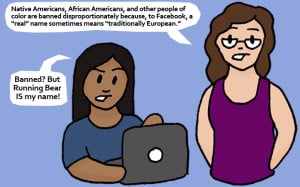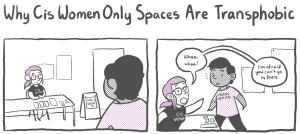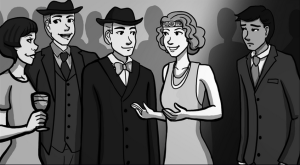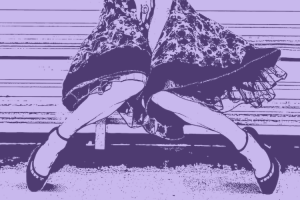Life has always been a perplexing journey for me.
As a kid, I was surrounded by people fitting into molds – or at least attempting to. And I was in the latter group. No matter how I pushed or curved or bent, I was never quite up to the task of fitting the boy mold.
I was never boy enough.
I subscribed to the typical favorites of a socially approved boy – like video games, toy weapons, and action figures – and I believed that “boy things” and “girl things” were real (they’re not), but even still, I stood out and felt out of place.
It wasn’t until one Halloween night when my twin brother, my sister, and I were playing make-believe in our pirate costumes that my family took notice that I wasn’t truly following typical gender behaviors. I had suddenly got the urge to switch costumes with my sister.
I wanted to be the “girl pirate” instead.
My grandmother walks in after our quick wardrobe change and calmly asks us to switch back. The next Halloween, she got me a Batman costume and a Pink Power Ranger costume, for use in the house. I think she understood my non-compliance to gender long before I did, and I think she’s far more open-minded and intelligent than she’ll ever give herself credit for.
What is clear is that she loved me for me, and not whether or not I was going to grow up to be a “real man.”
These toys and costumes gave me a sense of power.
I got to be the person I saw myself as — a feminine boy and a feminine girl. Not being stopped from being myself made me feel like I had a right to exist, like I mattered just as much as anyone else.
And this empowerment stuck with me through the years – despite the lack of an active or visible queer community around me. As a result, I’m happy with who I am today and privileged enough to speak about my experiences being bigender.
This means that I don’t exclusively identify as a woman or a man.
My family was always very supportive of my differences in gender and sexuality, and I was allowed to do what made me happy.
Being both a feminine boy and a feminine girl made me happy.
I was never pressured to live up to the hyper masculine ideal that plagues boys in this world, so I came to terms with my gender early in my life. This was definitely a privilege.
The world is not nearly as inclusive as the friends and family that we choose — the ones who actually support us, at least. And even as a young child I could sense that other boys felt uncomfortable around me.
Cisgender men (ones who identify with the gender they were assigned at birth) and heterosexual men are taught not to embrace or explore gender fluidity – and I’m a living symbol of what they’re told to stay away from.
They’re taught to uphold normative societal values that being associated with a “sissy” like me could put their place in the world at risk. As a result, boys who choose to explore gender often have to do it in secret, with little to no guidance from the people around them.
I wish society didn’t tell boys to stay away from people like me, because all I want to do is start conversations, to tell boys it’s okay to step outside of the norm.
No one should have to spend years hiding because no one around them is telling them that they’re perfect however they choose to be, and that they can be happy living outside the mainstream.
The cause of this distance between boys and I clearly comes from a place of fear. It was easy for me to overcome my fears, and to explore, because I was not one of the boys put to the task of “being a man.”
I was lucky enough to live outside of the reality where not being tough would make me a target for harassment or violence.
The Dangers of Boys Exploring Gender
The same cannot be said for all boys in this world.
In other realities, showing emotion, or anything else society deems feminine, can lead to physical assaults and social outcasting. Boys can go from passing safely in the hallway to being called a “sissy” or a weirdo in an instant.
There’s not a long list of ways women have advantage over men, but in exploring gender girls definitely have more flexibility. A girl who loves cars, sports, and “boys clothing” might be called a tomboy, while a boy who loves Barbies, princesses, and dresses would, again, be a called a “sissy,” and possibly get assaulted in the process.
Regardless of perceived gender, it’s never okay to call someone outside of their name, whether it’s the socially approved “tomboy” or any of the many negative term against feminine or non-conforming boys.
It’s crucial for us to recognize that there is no positive or even neutral term in our culture for a feminine boy.
Given the challenges of gender exploration for boys, the act of affirming within yourself that you don’t fit the cis gender identity, or admitting that you might be a little different, are huge and powerful things.
(But please, don’t feel the need to find and accept your gender identity immediately. It’s not a race!)
Here’s a short list of things to remember if you feel like you may be, or know someone who is, gender non-conforming.
1. You Get to Decide How to Express Your Gender
You don’t owe anyone else your truth, and don’t have to live your truth according to anyone else.
Being gender non-conforming does not necessarily mean that you have to dress like “a boy” one day, and dress like “a girl” the next. There is a limitless number of ways that you can express yourself. It’s all about what you enjoy and what you feel comfortable with.
The traditional gender binary tells us that there is boy and girl, but the reality is that those are just two small pieces in a bigger puzzle.
Non-binary and genderfluid people can identify or not identify however they choose. It’s not limited to boy and girl, everything in between, or anything related to those two labels. Gender isn’t a line. It’s a spectrum (or a planet).
Femininity does not belong to girls, and masculinity does not belong to boys. Therefore, you can be as feminine, masculine, or androgynous as you like — or any expression in the gender spectrum — without any responsibility to hold either of those traditional gender labels.
And while gender expression is important, it does not dictate your gender identity.
How you express yourself and how you feel are two different things. Just because you dress “like a boy” doesn’t mean you’re a boy. It means that you’re choosing to wear clothes that society dictates is for one group.
That’s more of a them problem than a you problem. If people assume your gender identity based on your gender expression that’s their fault, not yours. You know what people say about those who assume.
2. Gender Is a Social Construct That People Can Choose or Refuse to Follow
It is amazing (read: terrifying) how pervasive the idea that gender norms are natural is in this world. It’s particularly shocking because the faux-logic behind this belief can be easily broken down.
Reminder: “Boy things” and “girl things” don’t exist. Humanity was not built upon girls loving pink and boys loving blue. These things, and more, are nothing but offsets of capitalism to help regulate what people buy and participate in.
Dolls, for example, are not natural (i.e. made without human assistance). They’re human made objects that are “for girls” because society says so, not because there is some scientific reason why boys can’t or shouldn’t get enjoyment out of them. The main reason why boys don’t enjoy dolls is because they’re told that they don’t.
Objects and behaviors are not gendered.
The point is that you should live your life doing whatever feels enjoyable to you.
You don’t have to follow gender norms if you don’t want to; you have the power to do what you, and only you, want.
3. Exploring Doesn’t Mean There’s a Destination
Allowing yourself to think about different genders, or actively trying different things, does not mean you’re automatically transgender, non-binary, or genderfluid.
It’s okay to explore for the sake of exploring, and a journey is a journey no matter how far you go or how it ends – if it ends.
4. Your Journey Is Unique
I was able to explore my gender at a young age, because I knew there was no imminent threat against me if I did so. However, this is not the case for everyone.
If you feel like exploring your gender may result in physical, mental, or emotional harm, or you being kicked out of your house, you should carefully consider your moves.
Coming out with your different identities can be wholly fulfilling, but nothing is more important than your safety and well-being.
My story is not meant to push you to make immediate change, or to make you feel like you’re not strong. It’s meant to show you that there is hope and beauty in being non-binary or genderfluid, in a world where the narrative is, at best, tragic.
In the meantime, if you’re not in a safe environment to experiment with different forms of gender expression, you can try safer ways to learn more about yourself and others like you.
Writing in a journal is a great way to have an honest interior dialogue with yourself – barring you have parents who would read it without your permission. Reading is another great option, because you can find characters of different genders to learn and draw power from.
Life for a young person outside of the mainstream can be difficult, but once you’re independent you will have a richer life to live however you choose.
The struggles you face with your identity, either from holding it in or from the resistance of others, will make you an incredibly strong and resilient person.
***
There are lots of resources for you if you’re feeling at all confused about non-binary, genderfluid, and queer terminology. The Trans Student Educational Resources curated a list of queer definitions that are both thorough and comprehensive.
If you’re feeling conflicted about your gender, because of the ideas you’ve been fed all your life, check out 10 myths about non-binary people. It’s a nice reminder that a lot of people believing something doesn’t necessarily make it true.
Genderqueer Identities is another phenomenal site for both information and support of non-binary and genderfluid people.
The web is rich with essays, articles, and organizations around non-binary and genderfluid people, but it’s up to you to believe that your happiness and your identity are worth the time and research, because they are.
My a-ha moment didn’t come overnight. It took a lot of soul-searching, a whole lot of media consumption, and a great support system before I got there.
But I’m there now, I’m happy and living restraint-free, and you can, too – even if it doesn’t seem like it now.
Have faith and never give up on yourself.
Please remember, above all else, that you’re beautiful and that there are good people out there ready to love and support you for who you truly are.
[do_widget id=’text-101′]
Jayson Flores is the founder and editor of Gay on a Budget, a punk, emotional, intersectional blog with a little bit of sass. They’re working on their fiction in hopes of becoming the next J.K. Rowling, and their real-world writing in hopes of becoming the next Tavi Gevinson. Jayson can be found on Tumblr, and be contacted at [email protected] or on Twitter @gayonabudget.
This article was written with the input of Sam Dylan Finch, a Contributing Writer for Everyday Feminism. He is queer writer, activist, and educator based in the San Francisco Bay Area. In addition to his work at Everyday Feminism, he is also the founder of Let’s Queer Things Up!, his hella queer and very awesome blog. You can learn more about him here and read his articles here. Follow him on Twitter @samdylanfinch.
Search our 3000+ articles!
Read our articles about:
Our online racial justice training
Used by hundreds of universities, non-profits, and businesses.
Click to learn more





















